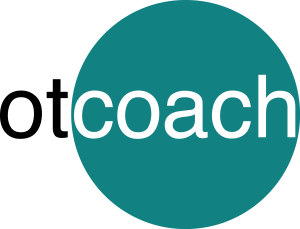We truly believe that OTs make great coaches!
Occupational Therapy holds at its heart, the importance of meaningful activities and their role in health/happiness. For over 100 years OT have used activities or meaningful occupations in a way unique to our profession. We believe that OT is the only truly holistic profession, which looks at all aspects of a person’s life. As well as understanding the occupational nature of human beings, we also get how important having a future vision and goals are and how negative self-beliefs can inhibit their achievement. We understand the barriers to human occupation allowing us to see beyond the remit that coaching alone would provide. OTs form good relationships with people and understand the importance of forming a relationship which is both collaborative and where is the power balance is shared equally.
Don’t we do this coaching thing already?
Many OTs feel that they already “coach” their clients and patients but whilst occupational therapy and coaching have a similar philosophy, coaching in its purist form is very different to OT. We believe passionately that coaching provides OTs with an exciting, different way of working and powerful tools which can be incorporated into an existed approach or as a stand-alone intervention.
So what is coaching?
The essence of coaching is to develop a conversational relationship in which a coach works with another person with the intention of them working towards a future vision or goal. Whilst this relationship is focused and objective, the heart of the coaching environment is essentially about both empathy and compassion. Working with a coach provides a sounding board, reflection and structure from a professional who will be objective, honest and on your side. Coaching can help enormously in enabling someone to make difficult changes in their life, working to unlock dreams, boost creativity and build a meaningful future based on balance and purpose.
Occupational therapists can use a “coach approach” to their OT work or use coaching as a stand-alone intervention. Pentland and Heinz (2016) give us this concise definition of coaching in the context of occupational therapy.:
“a specific conversational partnership for enabling occupational change that assists clients to clarify what is important to them, access their strengths, resources and creativity, choose goals and design and follow a plan of action to get what they want” (p57)
This is taken from the recently published “Enabling Positive Change: Coaching Conversations in Occupational Therapy” CAOT 2016, the first text on coaching and OT, which you can purchase here!
“During the sessions, she assists one to start thinking in a different direction about how to solve problems or tackle what seems like mountains of work and to get some order into things to make them manageable. She has been a great help to me… and I don’t think that I would have been able to cope with everything in the way I have if I had not been able to have these coaching sessions with her”
“Today, following a brief conversation with a service user, we managed to move from the terrible headache he experienced all day every day, to how brilliant his life is at the moment, apparently the best it has ever been” R.W.
If you want to start learning about coaching and develop skills to use in your OT practice, we have an online course “Coaching Skills for Occupational Therapists“. Here is what one participant has to say:
‘A very refreshing and lively opportunity to dip my toes into a new way of thinking! The Coaching Skills for OTs has already proved invaluable and I have been able to transfer learning directly into the workplace. It will build confidence in OTs at all levels”
Recent Post Blog Post
 1549Coaching and mental health OT Part 3 It’s been a long […]
1549Coaching and mental health OT Part 3 It’s been a long […] Jill GaraffaIf you are a stressed out or burned-out OT, feeling […]
Jill GaraffaIf you are a stressed out or burned-out OT, feeling […] Top Entrepreneurship Tips for OT’sTo be read before, during, probably after, and at […]
Top Entrepreneurship Tips for OT’sTo be read before, during, probably after, and at […] Doing Work That Matters; A Discussion between Rhiannon Crispe and Jen GashIf you haven’t “met” Rhiannon Crispe […]
Doing Work That Matters; A Discussion between Rhiannon Crispe and Jen GashIf you haven’t “met” Rhiannon Crispe […]- Annie BonsallWith a background in the NHS, Annie weaves […]

